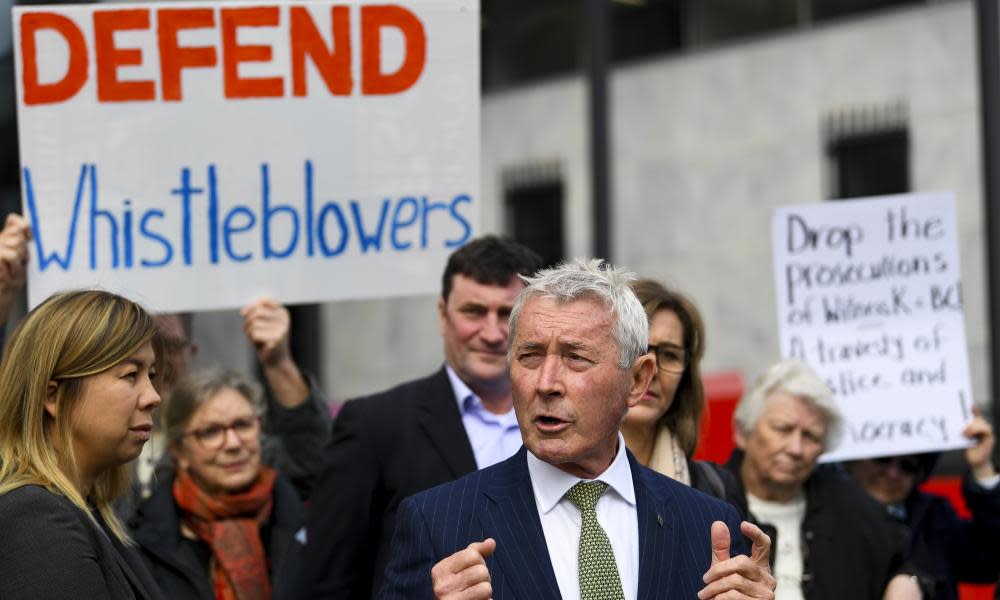Witness K lawyer Bernard Collaery wins international free speech prize

The Australian lawyer Bernard Collaery has won a prestigious British free speech prize for his efforts exposing a secret Australian operation to bug Timor-Leste’s fledgling government during sensitive oil and gas negotiations.
Collaery is still being pursued by the Australian government through the criminal courts and, if convicted, the barrister and former ACT attorney general faces jail for allegedly sharing protected intelligence information.
The charge stems from an episode during which Collaery, who frequently acted for intelligence officers, represented an Australian spy known as Witness K, who had grown increasingly concerned about a 2004 mission to bug the government offices of Timor-Leste during commercial negotiations with Australia, an ally, to carve up the resource-rich Timor Sea.
The actions of Witness K and Collaery helped Timor-Leste, one of the world’s poorest nations, take a case to the international courts and, eventually, renegotiate a fairer deal.
Related: Witness K and the 'outrageous' spy scandal that failed to shame Australia
Now, Collaery has been recognised with the International Blueprint for Free Speech Whistleblowing prize, which recognises the bravery and integrity of whistleblowers who have made a positive impact in the public interest. Previous winners of Blueprint for Free Speech awards include Chelsea Manning, who won while behind bars in 2016 at a maximum security prison in Kansas, and Nick Martin, the doctor who blew the whistle on Australia’s treatment of asylum seekers on Nauru.
Collaery will share £12,000 in prize money with another winner, Sally Masterton, a former Lloyds Banking Group employee who revealed a failure to act on evidence of fraud.
Collaery told the Guardian he was honoured to win the prize.
“I’m honoured and privileged and I’m going to dedicate the award to funding a granddaughter of mine through years 11 and 12,” he said.
“The rule of law, I learned from my years in Cambridge, has been more securely protected there than it is in Australia, and I’m deeply grateful that the award has come from Britain, a country my father died, as an Australian, protecting.”
One of the judges, Lady Hollick, an award-winning former investigative television journalist, described Collaery’s story as “extraordinary”.
She said it showed the dangers posed to those who told the truth about the Timor-Leste scandal.
“It’s a story of spies, international espionage and corporate greed,” she said. “One of the richest countries in the Asia Pacific spied on and betrayed one of the poorest.
Related: Witness K is in the dock but institutions vital to Australia’s democracy are on trial | Ian Cunliffe
“Today the tiny nation of Timor-Leste has finally achieved a better outcome. Australia has been forced to give it a fairer proportion of the oil and gas revenues.
“However, those who have told the truth about the case are still in a dangerous situation due to retaliation.
“Bernard Collaery’s story highlights that those under threat no longer include only whistleblowers and the journalists who work with them in the public interest. Increasingly, whistleblowers’ lawyers are now being targeted.”
Collaery and Witness K’s cases both remain before the courts in the Australian Capital Territory.
In October, the Law Council of Australia threw its support behind Collaery. It took particular umbrage at the secrecy surrounding his case, in part enforced through the national security information act, which is designed to govern the handling of sensitive and protected information by the courts.
The council warned that the laws were protecting “broadly defined national security at the expense of the rights of the accused”.


